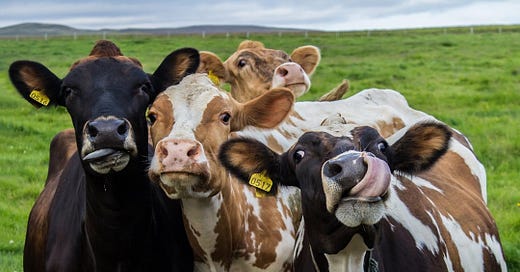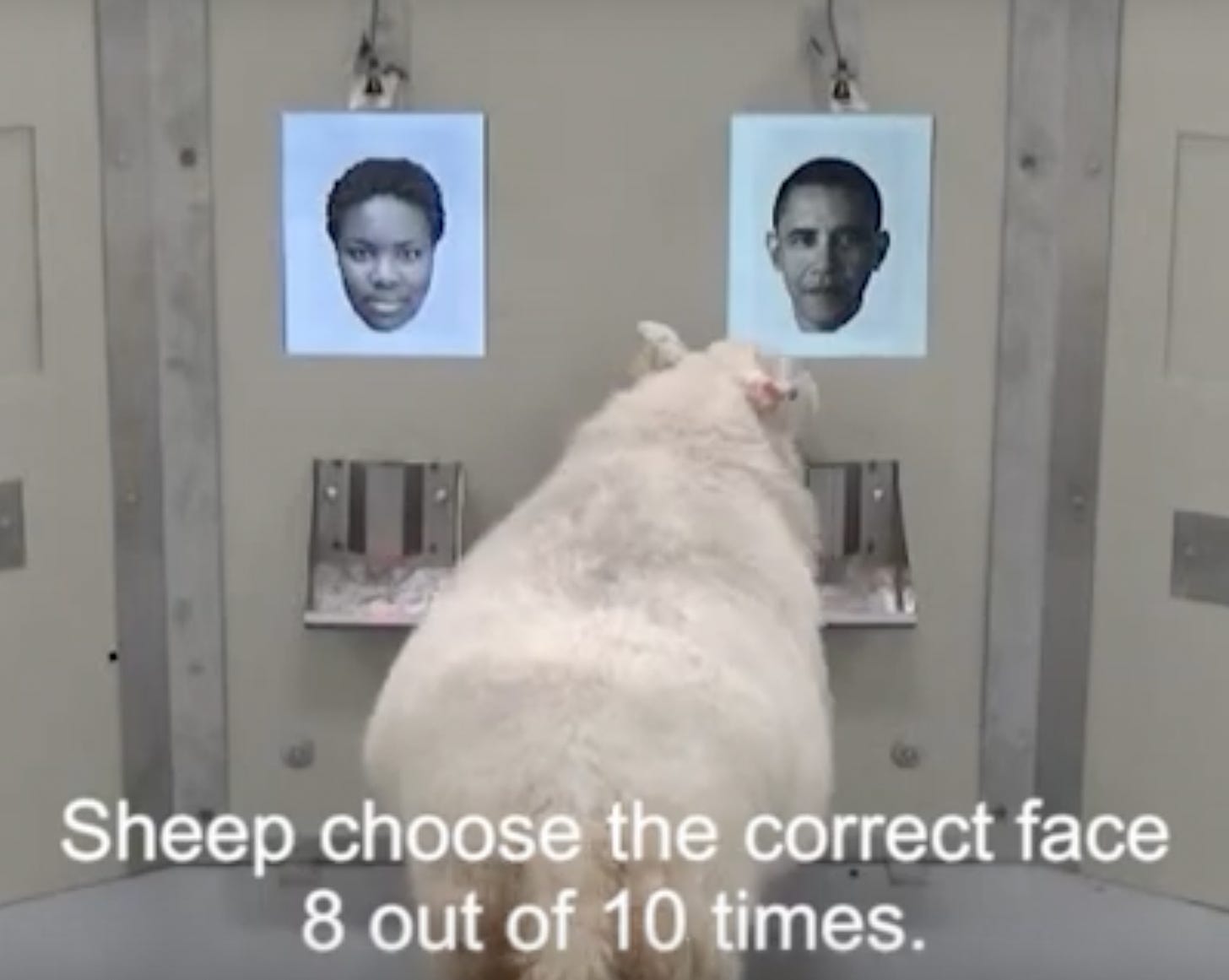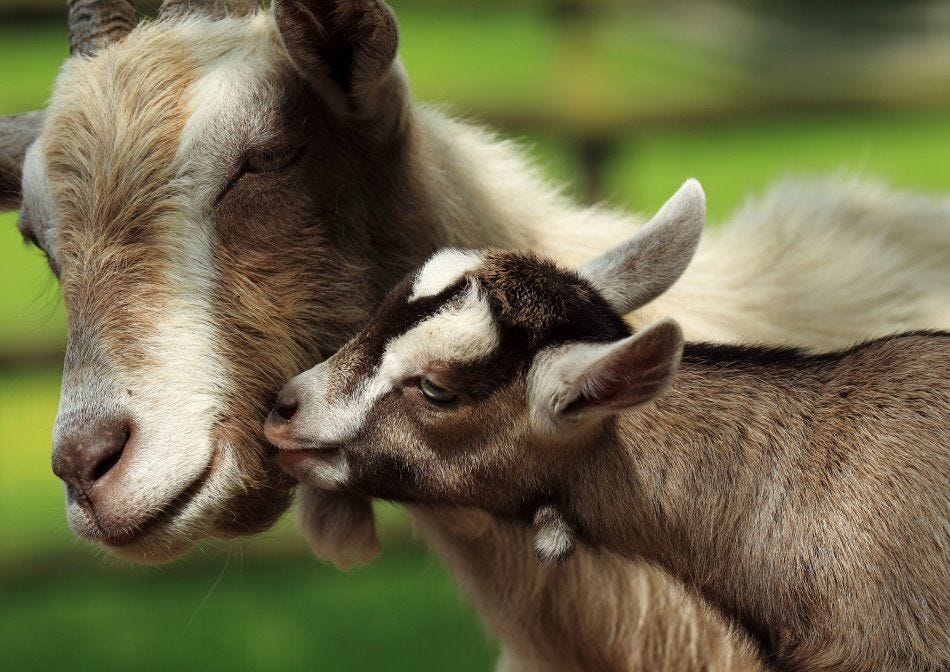On Loving Animals
Everyone can and should be an animal advocate—diet matters less than you think.
Anyone who’s had a pet knows how human they can seem. Cats are capricious and conniving, yet they’ll dotingly care for you when you’re sick—language barrier notwithstanding. Dogs are jolly and loyal, territorial and emotional, like a your sidekick or partner in crime. What is true about household pets holds for other animals. Pigs can play video games. Sheep are deeply social animals, who recognize each others’ faces—and human faces, too. Elephants grieve for their dead loved-ones. Cows have best friends, with whom they prefer to graze and rest.
Despite being so alien, non-human animals seem shockingly similar to us. We’ve been socialized to ignore their well-being since our main interactions with them happen once they’re already dead, butchered, and sitting in a grocery store freezer. But we ought to apply the empathy we naturally feel for our pets to all animals.
Caring about animals is clearly the right thing to do, especially given that we’re torturing billions (actually trillions) of them annually, and all the arguments against caring about animals fall apart upon close inspection (see this article by
and this article by friend of the blog ).I think that you should care about animals and their welfare, and you should identify as an animal advocate—regardless of your current diet. A shift in the way you view yourself and animals, a personal commitment to the cause of helping animals, is prior to everything else. The first step toward political activism on behalf of animals, toward donating to effective animal welfare charities, toward protesting for factory farming reforms, and toward shifting your diet away from animal products is a shift in moral attitude.
It’s a personal, introspective process, where you recognize that you might have made some ethical mistakes, that you might be a hypocrite, that you might not be able to live up to your ideals; but you decide anyway that you love animals and want to help them. We need a community of animal advocates, a political constituency even, if we are ever to liberate them.
The problem is that caring about animals is really unpopular and often socially ostracized. Human culture is deeply steeped in meat-eating and anthropocentrism, so when one advocates that we expand our circle of moral consideration to contain animals as well, the response is often haughty dismissal (“I’ll eat double the meat to make up for your veganism”) or lame resignation (“I know it’s wrong…but I can’t stop”). Even if people are willing to admit that killing animals is wrong, they’re usually unwilling or unable to change their attitude or behaviour. As Scott Alexander noted, “Most people are only about as moral as the average of the other people they hear about and interact with—if the rest of your society feels okay with slavery, probably you will too.”
I think Scott is right. Our moral reasoning is often clouded by social conformity and the idea that other people’s wrongdoings justify our own. Though I normally stick to the vegan diet, in certain social settings where it feels like everyone is indulging—like at parties and when I’m on vacation—I’ll cheat.
The first nineteen years of my life were devoid of animal advocacy. Though I extolled rational thinking for other issues, animal welfare was a reason-free zone. I think that part of me thought that by admitting that eating animals was wrong, I would also be admitting that I and most of my peers were bad people—which I refused do. This is a really unfortunate way of viewing things. If joining a movement requires significant lifestyle changes and moral self-flagellation, that movement probably isn’t going to grow. But the way we treat animals, and the way we allow them to be treated1, is one of the greatest moral catastrophes of all time. So we desperately need the animal welfare movement to grow.
Diet Isn’t Everything
Part of the issue is that the animal welfare movement can feel kinda elitist and cliquey. It is, after all, a group of people who view themselves as morally superior to everyone else.2 There can be a deep sense of disdain for meat-eaters (or carnists, as vegans might say). Some vegans are so stiflingly severe about the diet that it seems they’re mostly into it so that they can feel righteous and yell at others about how strict their regimen is; helping animals is a secondary consideration at best.
Fellow animal advocate
correctly writes that, “[t]he problem is that dying on the hill of puritanism, fighting a battle of symbolic offenses, will just turn people off from the cause.” Of course, diet is not purely symbolic (which Silas notes), and in the above quote, he’s talking about other supposed offences that hyper-vegans would decry (like wearing a second-hand leather jacket).The truth is that you can have a much larger postitive impact on animal welfare for a similar cost to yourself through donation and political activism than through the vegan diet. And diet purism might alienate away from the animal welfare movement. We should certainly preserve the respect that is accorded to those who follow the vegan diet: it's important as a positive social influence that can inspire others, and many people value consistency between beliefs and actions. But it’s far from clear that we should view diet as the be-all-end-all of animal advocacy. Donating to effective charities is probably way more important than altering your diet.
In his article defending vegan and carbon offsets, fellow animal advocate and friend of the blog
extolled the benefits of donating to charity.3 He noted that top charities are staffed by experts, can pool resources, unlock economies of scale, leverage political capital, and are held accountable by watchdog groups, which audit them annually. Often, the best way to do good is to give resources to those who do good professionally, rather than relying on personal efforts. (Obviously, the best thing to do is to be vegan and donate to effective charities.)Humam goes on to show that even small donations to effective animal welfare charities have extremely high expected value:
Many reputable animal welfare charities have made impressive strides towards reducing suffering. For example, the Humane League has lobbied the US, UK, and Mexican governments to implement fish and chicken farming regulations. In the US, this lobbying was successful—leading, in part, to Proposition 12, the strongest legislation for chicken welfare in the country. The Humane league also targets companies and individuals. One of their corporate outreach projects secured 25 cage-free commitments (with an estimated 48%–84% follow-through rate). These corporate campaigns are effective and improve 9-120 chicken life-years per dollar spent. On the higher end, estimates place cost efficacy at 501 to 846 quality-adjusted life years per dollar spent.
Though I think we should not conceptualize ethics in terms of “offsetting harms” (because we should merely strive to do the most good we can), you can probably offset a year of eating animals with a donation of less than $100 to the most effective animal welfare charities. If you find offsetting to be morally dubious, check out Scott Alexander’s classic essay Axiology, Morality, and Law.
So if you’ve just now decided that you’re an animal advocate but you’re unwilling to change your diet for the time being, I suggest you set up a modest recurring donation to an effective animal welfare charity.
The People Are With Us
Most people are not monsters. They like animals. They recognize that killing billions of animals in heinous ways is not OK. (Though there is this one guy on Substack who seems really fixated on torturing shrimp. He has been rebutted at length.)
Surveys consistently show that the public is concerned about animal welfare and generally supports policies that are meant to help animals.4 People even claim to be willing to spend more on food products if it means better conditions for animals. But the vegan diet is not doing too well.
So what to do? I think we should focus foremost on cultivating a societal norm in favour of animal advocacy. We want people to feel welcome in the animal welfare movement. They shouldn’t be shunned or shamed. If you still eat animal products but recognize that it’s wrong and commit to trying to do something to help animals effectively, you’re well on your way to becoming an animal advocate! Welcome to the movement. Being self-aware and self-critical is a virtue, not a fault.
Now that you’re an animal advocate, you should feel free to call your representatives and tell them that you care about animal welfare and that you oppose efforts to repeal animal welfare regulations for factory farms. You can follow Lewis Bollard to stay up to date on animal welfare policy issues. When someone asks you what you’re into at a party, along with mentioning your other interests, you could explain how you care about animal welfare and why it’s an important issue to you. You could start reading Open Philanthropy’s Farm Animal Welfare newsletter or the Mercy for Animals blog. Maybe start by checking out 10 Big Wins in 2024 for Farmed Animals. Try incorporating animal welfare into the realm of things you care about, think about, and talk about.
The Future of the Animal Welfare Movement
The animal welfare movement is young and still changing. We’re still researching and debating which strategies to pursue and which issues are most pressing. It’s important that we maintain a generally empathetic pro-animal stance—this is why I care about cultivating a societal norm in favour of animal advocacy—but we must also keep our minds open and impartially consider all strategies for helping animals, because our understanding of which strategies are most effective will likely shift over time. Many things that seemed counterintuitive about animal welfare in the past turned out to be true.
For example, it turns out, helping small animals is way more important than helping large ones. It turns out, the effect of our diet on animal welfare dwarfs its effect on climate, meaning that it’s better to eat beef than chicken or fish. It turns out, there are more farmed shrimp than any other farmed animal species. It turns out, being pescatarian is far worse for animal welfare than being a regular omnivore. It turns out, being vegetarian can be worse too, if it involves an egg-heavy diet. Brian Tomasik calculated that “…creating demand for a kilogram of farmed catfish meat causes ~20,000 times as much direct suffering as creating demand for a kilogram of milk.” Things findings seem weird and surprising, and we should expect to keep learning counterintuitive things about animal welfare in the future, and adapt our strategies accordingly.

As we learn about the weirdness of animal welfare, we will need people to be adaptive. Our strategies must evolve to match the arguments and data. Right now, there’s a huge mismatch:
To address all of these issues, we need a large and politically active group of animal advocates, people who care about animals and want to help. The vegan diet will and probably should remain a key part of our strategy, but we must accept others if we wish to have systemic impact.
A Brief Note (for Vegan Eyes Only)
If today is your first day as an animal advocate, I suggest you not read beyond this point. Once you’ve become accustomed to the idea that we ought to care about cute, photogenic animals like cows and sheep, then you can return to this post. I leave you with a cool photo taken by Derek Parfit in Saint Petersburg:
Shut Up and Multiply
Regarding the daunting problem of wild animal welfare (rather than just farmed animal welfare), we’re at a bit of a loss. Addressing this problem will require extensive research by ecologists, biologists, philosophers, environmentalists, and others. Many people will say that caring about wild animal welfare, shrimp welfare, and insect welfare goes too far—you have to get off the “crazy train” somewhere. It makes sense that people feel that way at first because it’s so much easier to empathize with cats and dogs and cows than with small, weird looking animals. But I think we need to stay on the crazy train and white-knuckle-it all the way to moral truth.5
Real talk—it’s estimated that there are between 10^18 and 10^19 insects. There’s a good chance they’re sentient and they might have terrible lives in the wild. Take that lower bound estimate for the number of insects, multiply it by 10% to represent conservative sceptism of insect sentience, and then multiply that by 0.01% to represent an extremely conservative estimate of how much we ought to value insect welfare compare to human welfare. That gets you: 10^18 * 0.1 * 0.0001 = 10^13 or 10 trillion.
You can keep devaluing that by as many factors as you want. Perhaps insects matter less because they can’t read Tolstoy or ponder the meaning of the universe. But when you get down to brass tacks, the total amount of moral weight present in the wild insect population is probably way bigger than that in the current human population. The moral impact of our decisions mostly concerns bugs.6
I suspect that the correct moral thing to do, in light of that, is bizarre. I don’t know what it is; and I don’t even know if humans have had a net-positive or net-negative impact on insect welfare. But I’m pretty sure the right course of action will not be something that is convenient or socially acceptable or perfectly within the realm of normal ethical beliefs.
So this why we need to cultivate two virtues in society: animal advocacy (caring about animals, not denigrating veganism) and open-mindedness (cause-neutrality, openness to counterintuitive strategies).
I’m talking about wild animal welfare.
Not unreasonably so
However, they also underestimate the number of animals raised for consumption who grow up in factory farms—the answer is basically all of them, ~97.5%.
Getting off the crazy train due to cognitive biases like scope neglect and thinking bugs are weird is far crazier!
See Scott Alexander’s article on why he will not eat the bugs.













Thank you for the shoutout, Theo! I loved the article. Sorry, but I read past the section I was allowed to, and I didn’t like it. I am scared to dive into the insect moral worth rabbit hole for fear of a world-ending conclusion. When I was 11, I tormented the anthills on my lawn with water and the occasional lawnmower. Even though 11-year-old me might have prevented millions of ant generations, this was wrong. I concede that insects have moral worth -- but I don't think it's much at all. Ants outnumber humans 2.5 million to 1; however, humans outneuron ants 344 thousand to 1. I think an ant has a vanishingly low ability to understand suffering or feel pain compared to a human, cow, or chicken. So, for the time being, I am okay with insect farming as an alternative to livestock farming.
Where do these sentience numbers come from? You have pigs at 1, which is presumably where humans are. So if you had a trolley problem situation with a choice of killing five pigs or one human infant, you’d kill the baby? That would seem to be the implication of this.